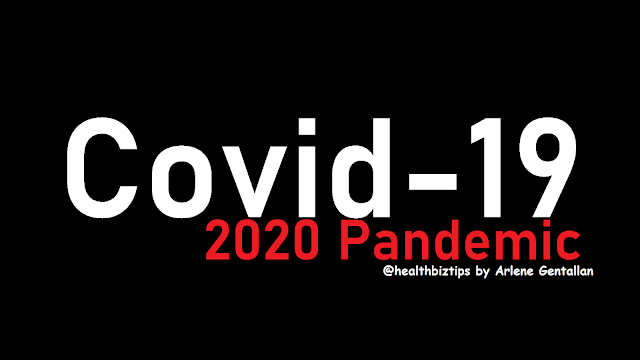What is Covid-19 (coronavirus disease)?
 |
| What is Covid-19 (coronavirus disease)? | @healthbiztips |
What is Covid-19?
@healthbiztips by Arlene Gentallan | health blog
Covid-19 (short for coronavirus disease 2019) has symptoms mimicking flu. These symptoms include dry cough, sore throat, fever, fatigue, muscle pain, loss of smell or taste, diarrhea, and can escalate to severe symptoms such as difficulty of breathing, in which the person may require the support of breathing devices. It is worth noting however, that there are asymptomatic carriers or those who can spread the covid even without showing signs and symptoms. In other cases, a covid positive individual only shows minor symptoms such as loss of smell or taste.
Covid-19 is the official name of a disease that was first identified in December 2019 in Wuhan, Hubei province, China in which they noted a spike in the number of pneumonia cases. Back in January 2020, this illness was temporarily called the 2019 novel coronavirus (2019-nCoV).
The inflammation and subsequent respiratory damage brought about by covid-19 can lead to blood clot formation and increased predisposition to stroke, heart attack, and heart failure.
Causative agent:
The virus responsible for causing covid-19 is officially named severe acute respiratory syndrome coronavirus 2 (SARS-CoV-2).
In the months that ensued, from China, it spread in multiple nations across the globe and in March 11, 2020, the World Health Organization (WHO) declared covid-19 a pandemic.
Signs and symptoms of covid-19 are:
- Loss of smell or taste are typically early on the course of the illness.
- Fever
- Cough
- Sore throat
- Body pain or malaise
- Headache
- Diarrhea
- Loss of appetite
- Nausea
- Runny nose
- Clogged nose
- Difficulty of breathing
Incubation period
Onset of symptoms can occur 2 to 14 days from the time of exposure to the coronavirus.
Mode of transmission
Mode of transmission is human-to-human through droplets coming out from the nose or mouth of an infected person when talking, sneezing, or coughing. In an enclosed space with no ventilation, the coronavirus can remain airborne for several hours before dropping into the ground.
A person can also acquire covid-19 by touching surfaces or articles contaminated with the coronavirus and then touching the eyes, nose, or mouth afterwards.
How to prevent covid-19?
The public is encouraged to adapt health measures such as the wearing of mask (cloth face masks are still advised in the absence of medical grade masks that are reserved for health care workers), practice social distancing, regular handwashing, and avoiding public gatherings to minimize risk of exposure and transmission of the SARS-CoV-2 virus.
As of September 2020, several vaccines are currently under development and trial. In the meantime, there had been several trial drugs that were incorporated on the regimen of patients to help with the prognosis of the disease. Some of these drugs are hydroxychloroquine and favipiravir.







